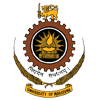The Department of Physiology plays a vital role in the pre-clinical phase of the MBBS curriculum at the Faculty of Medicine, University of Moratuwa. As part of the basic sciences stream, it is responsible for teaching and guiding students through the principles and mechanisms that govern normal body functions at the cellular, tissue, organ, and system levels.
Physiology forms the foundation of clinical medicine. A strong grasp of physiological processes is essential for understanding disease mechanisms, interpreting clinical symptoms, and formulating treatment strategies. Therefore, the department ensures that physiology is taught not only as a theoretical science but also with clear links to clinical practice.
The department actively contributes to the teaching-learning activities in multiple system-based modules during Phase 1 of the curriculum, including:
Foundation, Blood and Immunology, Cardiovascular, Respiratory, Gastrointestinal, Endocrine, Metabolism and Nutrition, Reproductive, Renal, Locomotor, and Neuroscience modules.
Teaching is delivered through a dynamic mix of interactive lectures, hands-on laboratory sessions, tutorials, small group discussions, and simulation-based learning where applicable. Continuous assessments are integrated to monitor student progress and encourage reflective learning.
The Department of Physiology also encourages students to apply scientific reasoning, engage with research, and appreciate the physiological basis of health and disease. Future plans include expanding student-led experiments, introducing virtual physiology lab tools, and offering collaborative research opportunities.
Our ultimate goal is to empower medical students with a solid understanding of how the human body functions, preparing them to become confident and competent clinicians, researchers, and lifelong learners.
